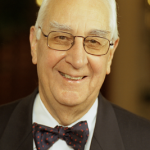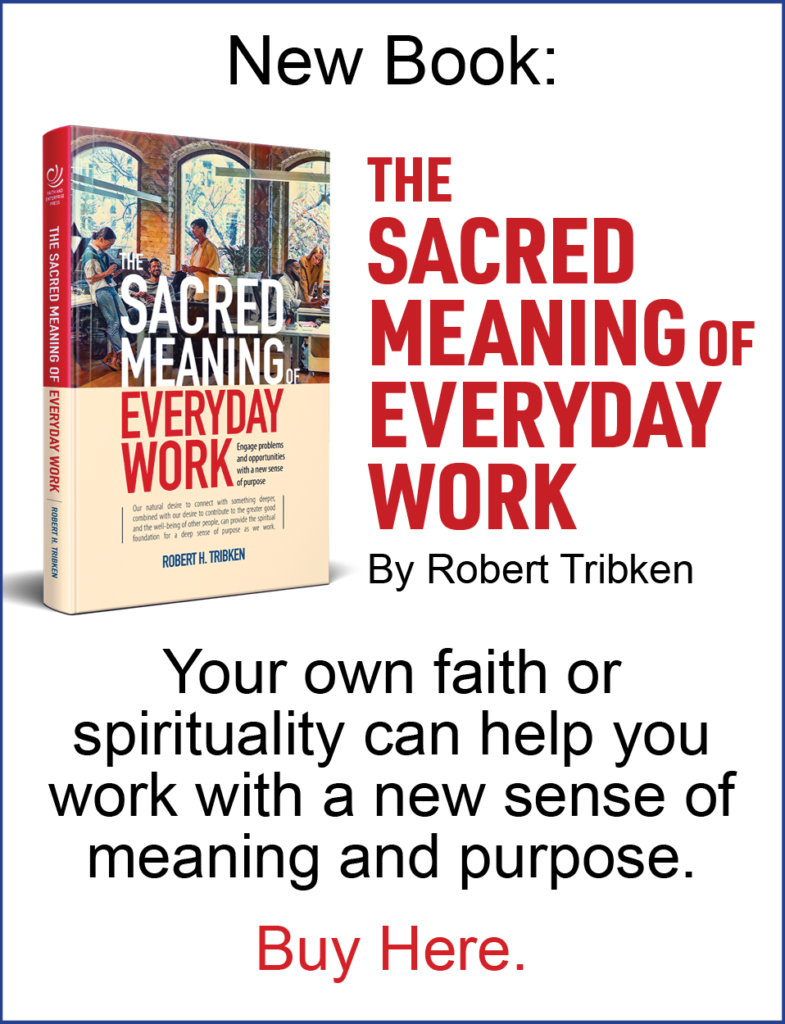
A Theology of Entrepreneurship
 “The Entrepreneurial Calling: Perspectives from Rahner” by the late William J. Toth of Seton Hall is an extraordinary theological reflection on the entrepreneurial vocation and the deeper significance of the entrepreneur’s hope, risk, and service to others.
“The Entrepreneurial Calling: Perspectives from Rahner” by the late William J. Toth of Seton Hall is an extraordinary theological reflection on the entrepreneurial vocation and the deeper significance of the entrepreneur’s hope, risk, and service to others.
A central concept for Toth was that of “providential love.” This idea combines anticipation of the future with a desire to create something of value for others. The entrepreneur intends to create part of the future but, at the same time, recognizes that success or failure will be determined by those who are free to accept or reject the offer made by the entrepreneur.
Lectio Divina and Guigo’s Ladder for Monks
 Lectio Divina is a traditional monastic spiritual practice that combines scripture and a form of contemplative prayer. It has recently become popular among contemplative Christians as a way to a deeper prayer experience. It is one of the practices we have taught in our Spiritual Practices for Your Work Life retreats.
Lectio Divina is a traditional monastic spiritual practice that combines scripture and a form of contemplative prayer. It has recently become popular among contemplative Christians as a way to a deeper prayer experience. It is one of the practices we have taught in our Spiritual Practices for Your Work Life retreats.
Hank Paulson on Prayer
 Former Secretary of the Treasury Hank Paulson wrote a spell binding memoir of his experience during the financial crisis of 2008. Much of it deals with the day to day effort to prevent a complete financial system meltdown, but one passage in particular deals with the role of prayer. After weeks of exhausting work and little sleep, there came a point where Paulson and his colleagues had done everything they could and still faced the possibility of catastrophe triggered by the impending failure of Lehman Brothers. And then, as told in the middle of a book about the financial system, Paulson telephones his wife and has this exchange:
Former Secretary of the Treasury Hank Paulson wrote a spell binding memoir of his experience during the financial crisis of 2008. Much of it deals with the day to day effort to prevent a complete financial system meltdown, but one passage in particular deals with the role of prayer. After weeks of exhausting work and little sleep, there came a point where Paulson and his colleagues had done everything they could and still faced the possibility of catastrophe triggered by the impending failure of Lehman Brothers. And then, as told in the middle of a book about the financial system, Paulson telephones his wife and has this exchange:
Wednesday Evening Prayer and Meditation Service
If you are in the Pasadena (California), La Canada, and Glendale area, you might be interested in a Prayer and Meditation Service we are conducting on Wednesday evenings, 6:15 to 7:00pm. If you are not in the area but might be interested in conducting something like...
Spiritual Intelligence: Does it exist?
I ran across an article written in 2000 by psychologist Robert Emmons that is well worth considering (I wish I had seen it earlier). Emmons raises the possibility that spirituality might be considered a form of intelligence consisting of five components (I am quoting Emmons):
Max De Pree and the Art of Leadership
 “The first responsibility of a leader is to define reality. The last is to say thank you. In between the two, the leader must become a servant and a debtor. That sums up the progress of an artful leader.” (Max De Pree: Leadership Is an Art, Page 11)
“The first responsibility of a leader is to define reality. The last is to say thank you. In between the two, the leader must become a servant and a debtor. That sums up the progress of an artful leader.” (Max De Pree: Leadership Is an Art, Page 11)
———
As many readers probably know, Max De Pree is the author of several highly regarded leadership books including Leadership Jazz: The Essential Elements of a Great Leader and Leadership Is an Art, and was the Chairman of Herman Miller, Inc., during an especially creative period for the company. He is also the inspiration and namesake for Fuller Theological Seminary’s Max De Pree Center for Leadership, from which I retired as a member of the advisory board a few months ago. I have recently been reflecting on De Pree’s approach to leadership, and believe that there is much we can learn from him.
Do We Really Want to Integrate Our Faith and Our Work?
 Underlying much of the “faith and work” movement and many of the books on the subject is the assumption that religious people want to connect their faith and their work. In a recent presentation to the Society for the Scientific Study of Religion, Rice University sociologist Brandon Vaidyanathan questioned this assumption and made some very interesting observations based on his research.During his presentation, he raised the provocative issue that perhaps people usually see faith and work as two competing spheres with separate devotions and would actually prefer to keep them separate.
Underlying much of the “faith and work” movement and many of the books on the subject is the assumption that religious people want to connect their faith and their work. In a recent presentation to the Society for the Scientific Study of Religion, Rice University sociologist Brandon Vaidyanathan questioned this assumption and made some very interesting observations based on his research.During his presentation, he raised the provocative issue that perhaps people usually see faith and work as two competing spheres with separate devotions and would actually prefer to keep them separate.
I think he is on to something important, but I think the problem is not so much that there is a necessary conflict between faith and work, but rather how we understand (or misunderstand) the nature of one or the other or perhaps both.
Conflicting Grammars of Life
 Different spheres of life have different grammars. By this I mean that not only do we use different words in different spheres, but that the logical rules and structural relationships between the words can be quite different as well. This can create a problem when we are trying to connect our faith and our work — two domains with two different sets of grammar. This is especially true when the differences are unconscious.
Different spheres of life have different grammars. By this I mean that not only do we use different words in different spheres, but that the logical rules and structural relationships between the words can be quite different as well. This can create a problem when we are trying to connect our faith and our work — two domains with two different sets of grammar. This is especially true when the differences are unconscious.
Compare the grammar of business with that of the “typical” church.
Chaplains in the Workplace
 Workplace chaplaincy services are receiving increased attention and appear to be a growing phenomena. An article by Cheryl Hall in the Dallas Morning News (November 25, 2014) reports on the firm Marketplace Ministries, Inc., and its founder Gil Stricklin.
Workplace chaplaincy services are receiving increased attention and appear to be a growing phenomena. An article by Cheryl Hall in the Dallas Morning News (November 25, 2014) reports on the firm Marketplace Ministries, Inc., and its founder Gil Stricklin.
Hall reports that Marketplace Ministries hires chaplains and provides services to businesses and other organizations for a fee. The chaplains provide a variety of services, all at the option and initiation of the employee. These can include counseling, providing a sympathetic ear, and helping the employee find resources for dealing with personal and family problems. Spirituality can be involved — but only at the invitation of the employee.
Holy Week Audio Meditations
I am writing this post on the Monday of Holy Week. While the post does not relate specifically to workplace faith and spirituality, you might nevertheless be interested in a series of daily Holy Week recorded...
De Pree Center Event: Faith, Leadership, and the Global Marketplace
Recommended: The Max De Pree Center for Leadership at Fuller Theological Seminary will host a lecture by Lord Brian Griffiths, Vice Chair of Goldman Sachs International, on the relationship between the Christian faith and the global marketplace, on April 10 (7p.m.) in...
Charles Marsh on Bonhoeffer Without a Church
 One striking aspect of Charles Marsh’s new biography about Dietrich Bonhoeffer is the degree to which Bonhoeffer’s church seemed to disappear. For someone as committed to, and embedded within, the church as Bonhoeffer, this must have been a highly distressing experience. How the experience seemed to affect him can have important lessons for us.
One striking aspect of Charles Marsh’s new biography about Dietrich Bonhoeffer is the degree to which Bonhoeffer’s church seemed to disappear. For someone as committed to, and embedded within, the church as Bonhoeffer, this must have been a highly distressing experience. How the experience seemed to affect him can have important lessons for us.
The Role of Congregations in Faith/Work Integration
 Baylor University sociologists Jerry Park, Jenna Rogers, Mitchell Neubert, and Kevin Dougherty released a new study looking at the role of congregations in encouraging healthy work attitudes. The study found that there tended to be higher ratings for affective organizational commitment and job satisfaction if the respondent’s congregation placed a higher value on work and the respondent had higher involvement with the congregation (as measured by attendance). If either element was missing (less importance placed on work by the congregation or less frequent attendance) then there appeared to be no positive benefit.
Baylor University sociologists Jerry Park, Jenna Rogers, Mitchell Neubert, and Kevin Dougherty released a new study looking at the role of congregations in encouraging healthy work attitudes. The study found that there tended to be higher ratings for affective organizational commitment and job satisfaction if the respondent’s congregation placed a higher value on work and the respondent had higher involvement with the congregation (as measured by attendance). If either element was missing (less importance placed on work by the congregation or less frequent attendance) then there appeared to be no positive benefit.
Business as Mission Conference – Partners Worldwide
Partner's Worldwide international business as mission conference Marketplace Revolution '14 is coming up on October 30 and 31, in Grand Rapids. Business as mission activists will be coming from a large number of countries to swap ideas and listen to speakers. More...
How to Keep Employees
 Andy Kessler of the Wall Street Journal has written an interesting article based on an interview with Reid Hoffman, the founder of LinkedIn. There are several key insights from Hoffman; one involved keeping innovative and adaptive employees in the newer heavily networked and fluid economy. For a company in the newer environment, a key to innovation and adaptation is having employees who are themselves innovative and adaptive. But how do you keep them? As Hoffman says, “what everyone knows is that when you hire someone, there is a good chance that they will eventually be working for someone else.” And the employees know this.
Andy Kessler of the Wall Street Journal has written an interesting article based on an interview with Reid Hoffman, the founder of LinkedIn. There are several key insights from Hoffman; one involved keeping innovative and adaptive employees in the newer heavily networked and fluid economy. For a company in the newer environment, a key to innovation and adaptation is having employees who are themselves innovative and adaptive. But how do you keep them? As Hoffman says, “what everyone knows is that when you hire someone, there is a good chance that they will eventually be working for someone else.” And the employees know this.


